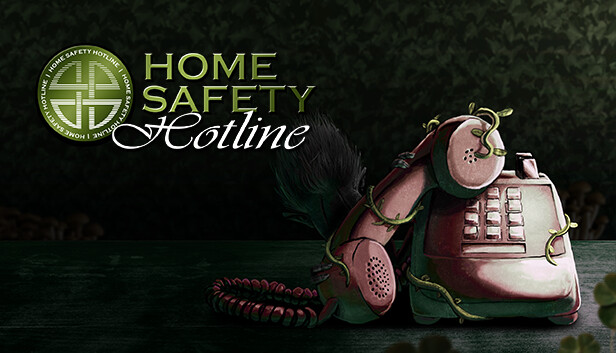Analog horror aesthetics have been growing in popularity over the last few years, even if in a lot of cases, “analog” just tends to mean, “the concept of a VCR distortion is the scariest thing I can imagine,” rather than some of the more interesting aspects of the analog world-that-was. One of those aspects was the way the world was far, far smaller than it used to be. While there is some nostalgia for the days of VHS tapes, corded phones, dial-up noises and more, sometimes the analog world could be truly terrifying by how isolated you were without realizing it. Unlike modern “digital” life in the first world, analog life meant that if you fell down a pile of dirt with your friends and broke your arm in half, it might take hours for you to get medical treatment since no one knew where you were or how to get to you, or how to get in touch with people that might be able to help you. (What a specific example, you say? Don’t worry about it.)
The smaller scope of the world made the parts of “analog horror” work in a way that many creators miss: That things you saw or thought you saw didn’t have answers; that the weird, scary noises you heard on the radio or witnessed as your television signal warped weren’t just transmission errors. That the shadows you think you see while trying to sleep weren’t monsters or demons; that the noise a phone made when off the hook didn’t imply your impending death. It was a world that you knew was bigger than you could understand but didn’t have the ways to get the answers or understanding of.
Perhaps that’s why Home Safety Hotline grabbed my attention so much. An analog horror game by Night Signal Network, Home Safety Hotline puts players in the role of a newly-hired phone operator for what seems to be a totally normal mid-nineties job: answering a help hotline for distressed customers, and providing them with the answers they need to solve their home emergencies. I first saw the game being played by a streamer that I enjoyed, and then a few days later a second streamer had also picked the game up. I had come in at very different points in both people’s playthroughs, and I immediately realized I needed to play the game for myself; I am glad I did, and I’ve spent the time since playing through it selling it to my immediate friend circle, so I thought I’d take the next logical step: Using my platform to sell the game to you, too, dear reader.
The True Horror: Answering Phone Calls
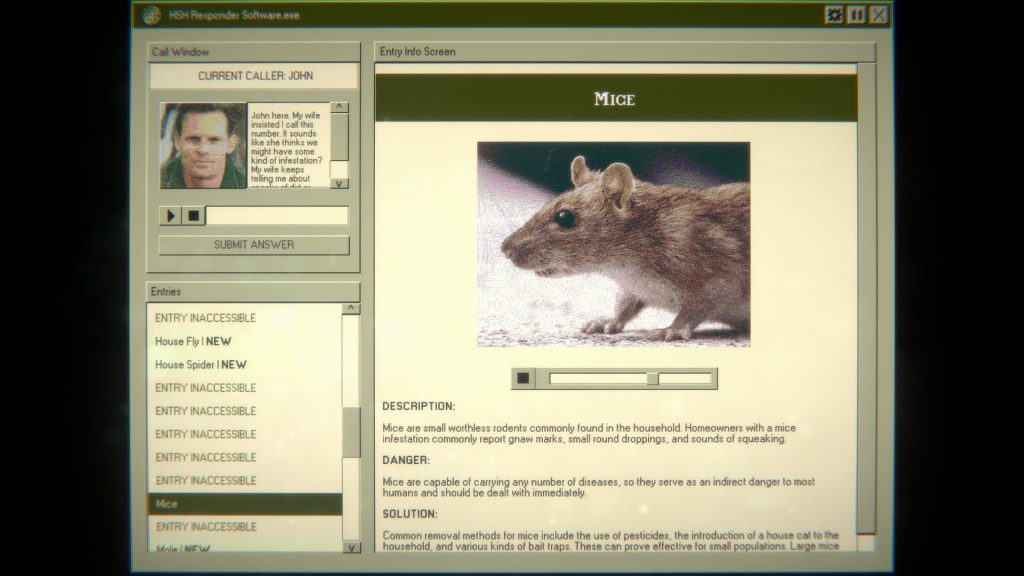
To provide as few spoilers as possible, the general gameplay loop of Home Safety Hotline is that your phone operator has to field calls from panicked customers of your company’s home safety services — calls that start out benign, but become increasingly and uncomfortably weird and upsetting as the game progresses. The story of the game takes place over the course of week (yes, you work weekends), with small skits, videos, e-mails, and other things breaking up the phone calls. It’s a very simple loop: calls come in and, using a scrollable list of options, you need to make the best possible guess as to what sort of problem your client is trying to solve. Noises in the attic? Maybe it’s a raccoon! Noises in the walls? Could be carpenter ants. Giant, gaping, mysterious cavern in your basement? Surely normal and routine; you should know the answer to that.
The simplicity of the game helps the analog aesthetic; your options are limited, and your answers are also limited. If your database stops working or has some sort of glitch, you’re out of luck, having to rely entirely on your memory of all of the entries you read beforehand (You did of course read and memorize all of them, right?) to help your panicking clients. The voice acting for each call is quite impressive, ranging from annoyed to distressed to downright upsetting, with the tone of the game floating somewhere between a sense of foreboding dread and whimsical weirdness, making some of the more upsetting and horrific parts of the game hit even harder when they cross that line. Perhaps the only gripe I have is that a few of the calls are very obtuse, and since you rely on the calls and their text for the context clues to find the answers you need, it can sometimes be a little frustrating when the information you’re given not only doesn’t line up but seems difficult to parse. Of course, that does add a layer of realism: People in distress are often not fantastic at providing exact, specific details, but I did find it interesting that almost everyone I’ve spoken to who played this got one specific call in particular wrong because the clues given didn’t make sense to them. Still, this happened at maximum two times to me in the game, so it isn’t a major problem, just an annoying one.
Fae Friends
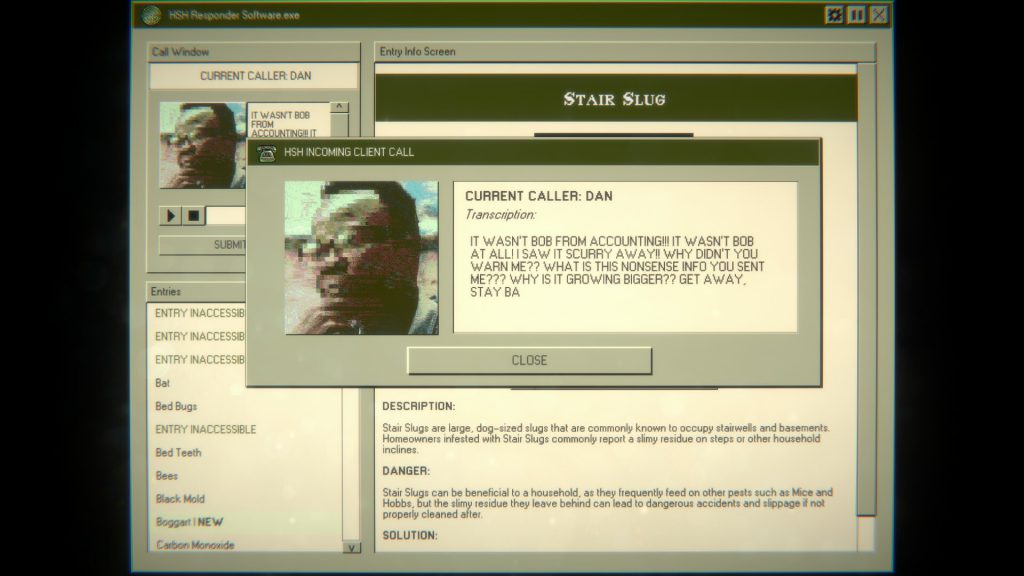
What really struck me with Home Safety Network was the fun ways in which Celtic fae lore and superstitions combined with just totally bizarre and original monsters and inexplicable supernatural things, which were then tied together into the absurd concept of a company whose existence is to field calls to clients who need help with fae creatures invading their homes. HSH doesn’t try to provide answers to this (good, frankly), and instead just runs with the comedic concept of nineties office culture mixed with worrying if a spriggan is going to kill you for eating fruit in public. At times, the game almost made me think about what would have happened if Jim Henson, in the height of his Storyteller hours, had made a horror video game; I feel like it might have been something a little like this.
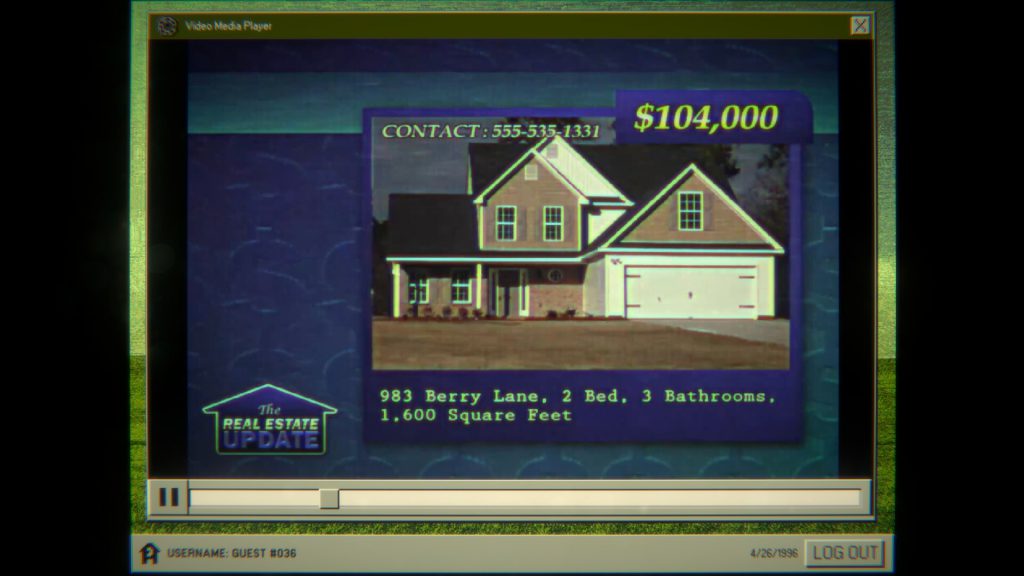
Similarly, the Night Signal team really nail the parts of “analog” horror that truly work: it wasn’t the bad VCR tracking or glitchy fuzz of found footage that was scary; it’s that the analog world was one where just enough information existed to make you nervous, but not enough information was available to provide you answers. A segment in the game mimics that of television broadcasts interrupted by an ominous emergency warning, the same kind I recall seeing as a kid, along with news bulletins and public broadcasts about missing people, crimes, and the like, devoid of context except the immediate interruption of normalcy and calm. The idea of fae creatures is charming until you realize that understanding or interacting with them randomly would likely always be bad, not even due to malicious intent but just the clashing of two worlds that shouldn’t overlap. The atmosphere in HSH is stellar and engrossing, and also encroachingly dreadful as you realize that providing an answer to a terrible problem doesn’t solve it or absolve the caller, you, or anyone else of the consequences, while also rendering you helpless to know the outcome of your advice; you only ever hear back from people you gave the wrong answer to.
Home Sweet Home
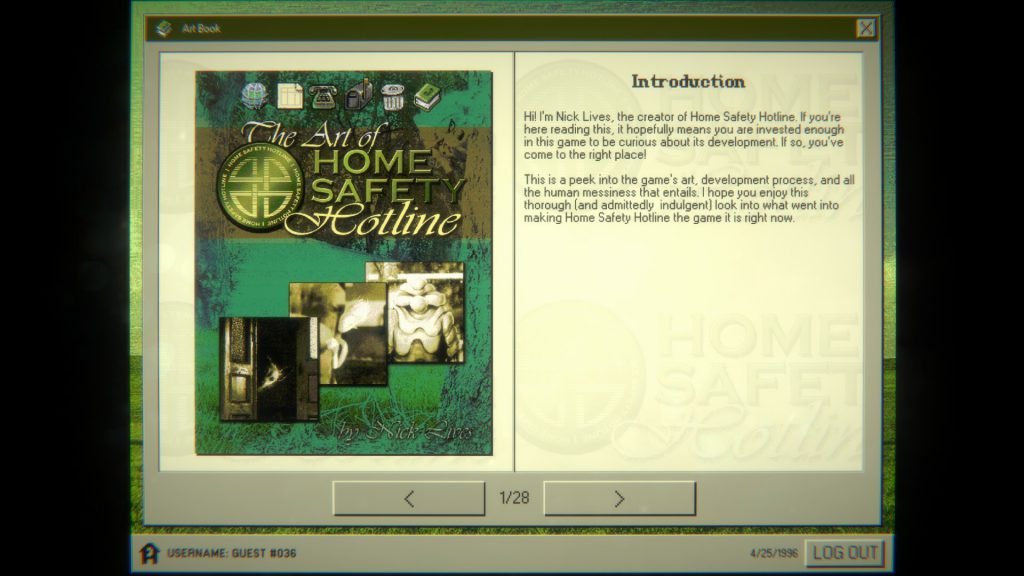
I don’t even know if I’d say that “as I’ve grown older” is the right excuse for my changing tastes in gaming, except that “older” has often meant “less available time.” I still play quite a lot of games: I have a rotation of mobile games I log into and keep up with, and I spend many nights on Apex Legends and FFXIV, so I cannot say I don’t have time to play games; just that I often have a hard time fitting in new games, especially single-player ones. So for me to go out of my way to buy and play HSH in a single sitting, and then ruminate on the game enough to get other people to buy it and play it so I could watch them play it on their own streams or over Discord calls, feels like an endorsement that might seem odd at first. But ever since I had my hands around HSH, it has had its hands around me, making me think of just how well-thought out and unique the game is in the space of horror games, a market that is growing increasingly bloated. HSH doesn’t attempt to scare you with jumpscares, gore, or cheap tricks, nor does it opt to give you anxiety attacks from atmospheric dread, but simply builds a rising sense that something is ‘off’ in what you are doing, with an ending pay off that was as satisfying as it was out of left field.
HSH reminds me of a new spate of games that I’d dub “Horror Where’s Waldo,” such as I’m On Observation Duty, where your job is something extremely mundane, but the sense of wrongness increases. Unlike IOOD, HSH doesn’t look to ‘get’ you. It just wants to build an atmosphere and immerse you in it. Once the game is over, players are able to retry to get perfect scores on the days they may have missed, and you’re even told what callers you got wrong to help you know what to do next time. Recently, as of a few days before this review, they also added a timed endless mode in which random callers will ask you for help, a sort of “answer as many as you can” score attack mode that I found very enjoyable. On the accessibility side of things, HSH tries to be extremely accommodating in ways that I really appreciate: if you have arachnophobia, for example, selecting that option will simply make images of spiders or spider-like things “break,” like an old 90s computer image not loading properly, rather than try to replace it with something hokey or just as jarringly weird. It felt like one of the best implementations of visual based -phobia filters that I’ve seen in a game so far that takes the idea seriously without intruding on gameplay at all.
Creepy Comfort
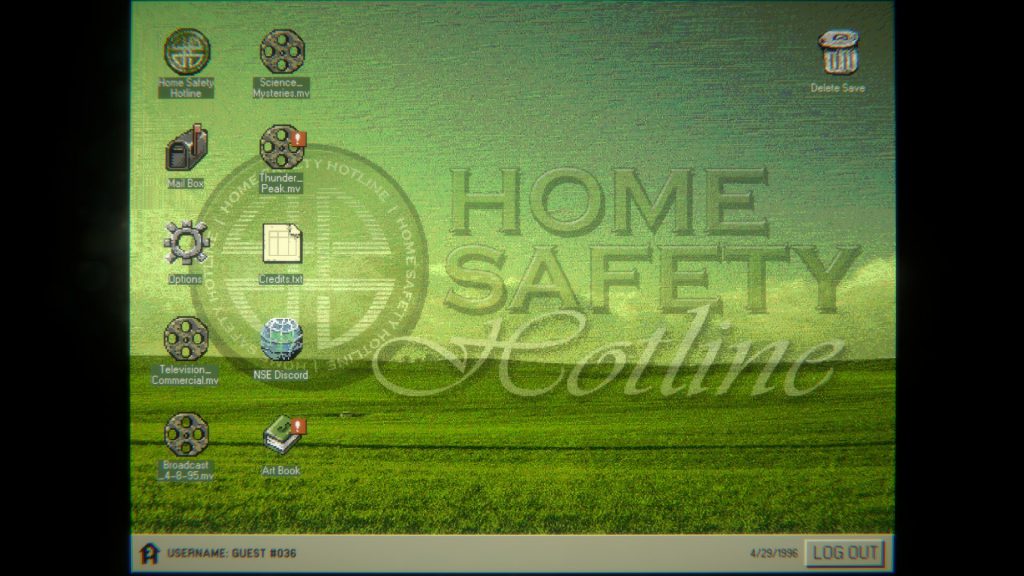
In a word, HSH is a cozy game, and that’s odd for a game that sometimes has voice acting that makes you feel deeply emotionally unsettled at what the implications of the call you just heard means. But that’s really the best way I can describe HSH: It draws you in with the analog aesthetics and vibe of weird horror storytelling it is going for, allows you to get comfortable with how the game wants you to go about playing it, and then continually ramps up the weirdness without making it overly pressing or stressful.
Even without the endless mode, I found myself drawn back to HSH and playing through it a few times. The answers don’t change, but I wanted to experience the game again and see if there were details I didn’t pick up on the last time I played it. For a game that cost 15 dollars, that’s another round of high praise I’d offer: I never for a moment felt like the game was wasting my time, or that I regret the time I spent with a game, something I have recently been struggling with as game prices have soared and my ability to justify spending 70+ dollars on something I may not devote the time to becomes harder to do. If you’re looking for a unique horror game that really nails the late analog era extremely well, pick up the phone and grab yourself a copy of Home Safety Hotline, and remember to brush up on both your home pest and fae lore. You never known when telling the difference between a common tick and a killer plant may save a life, maybe even yours.
Have any questions or feedback? Drop us a note in the comments below or email us at contact@goonhammer.com.
